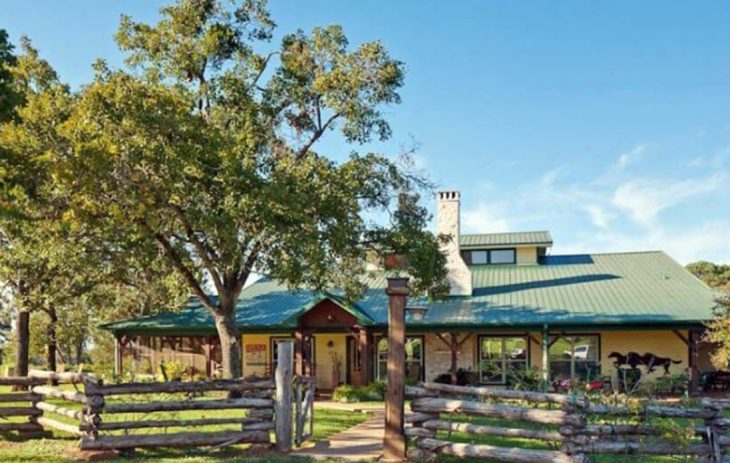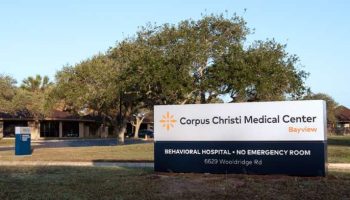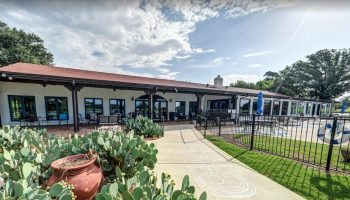About The Last Resort
The Last Resort Recovery Center in Smithville, Texas is a men’s men-only drug rehab with support extending to business professionals, military staff, and veterans, college students, first responders, healthcare professionals, and older adults. Most maor insurance plans are accepted along with self-pay. Payment assistance and financing options may also be available to those eligible.
Drug Detox and Ranch-Based Inpatient Care in Bastrop County
Here, you can kick your recovery into gear with medically supervised detox. A dedicated team is by your side to support you through this process and help you safely manage withdrawal symptoms and cravings.
After this, perhaps you’ll move onto the center’s inpatient residential program for intensive, round-the-clock care. The residential program takes place on a picturesque 52-acre horse ranch that provides a peaceful environment conducive to recovery.
Since you’re on a ranch, you may not be surprised to hear that equine therapy is part of the treatment process, with 20 horses available to support your emotional growth and healing.
As well as this, you can enjoy various amenities like an on-site fitness center, and an outdoor pool for exercise and relaxation. The ranch also boasts a yoga studio, and a meditation room is which you can tune out distractions, and come back to yourself in peace.
Outdoor activities are also included in treatment here, with an abundance of hiking trails for you to discover, along with outdoor lounge areas where you can reflect and relax.
Outpatient Addiction Treatment in Smithville, TX
For more flexible treatment options, you can choose from partial hospitalization (PHP), and intensive outpatient (IOP) programming. When you’re not in treatment, be sure to check out local nature hangouts like Buescher State Park or the Colorado River. These make great places for reflection and sober recreation.
Levels of Care
-
Inpatient
Inpatient and residential programs provide round-the-clock medical and emotional support as you live at the treatment facility. This level of care may be recommended if you have severe addictions or mental health conditions since it removes outside distractions and allows you to focus solely on therapy.
-
Aftercare
Aftercare programs provide ongoing support after you complete a rehab program. They may include several components to help you maintain sobriety including therapy, community support groups and relapse prevention strategies. This gives you a network of resources as you reintegrate into your daily life.
-
Dual Diagnosis
Dual diagnosis programs address substance use disorders and co-occurring mental health conditions simultaneously. This integrated approach to care improves the likelihood of long term recovery and stability by addressing the root causes of addiction.
-
Intervention
An intervention is a structured and professionally guided conversation with an individual who is struggling with addiction. During the conversation, family and friends will encourage you to seek treatment. This is often a pivotal step for those resistant to getting help.
Detox Service Setting
-
Inpatient Detox
Inpatient detox occurs in a dedicated treatment facility. You’ll live there around the clock and receive intensive medical support and supervision to help manage your withdrawal symptoms. It is suitable for individuals with moderate to severe addictions as it ensures a stable detox environment.
Programs
-
Adult (18+)
Adult programs address the substance use and life challenges specific to adults. Therapists can deliver sessions in individual, group and family settings. Services often include job support and life skills training in a structured environment.
-
Alcohol Detox
Alcohol detox programs offer medical support to help individuals withdraw safely from alcohol. Your care team may use medications to ease your symptoms and provide medical monitoring to address complications.
-
Animal Therapy
Animal therapy uses interactions with animals such as dogs or horses as part of treatment. You’ll learn to develop trust, lower your anxiety levels and regulate your emotions. This provides comfort and a sense of companionship during the recovery journey.
-
Cognitive Behavioral Therapy
Cognitive behavioral therapy focuses on changing harmful thought patterns and behaviors associated with addiction. You’ll learn healthier coping mechanisms by identifying and replacing negative thoughts. This improves your emotional resilience and decreases your relapse potential.
-
EMDR Therapy
EMDR stands for eye movement desensitization and reprocessing therapy. It helps you process traumatic memories that may underlie addiction. You’ll learn how to reduce emotional distress and begin healing from past events. This makes it effective for trauma related addiction causes.
-
Exercise Therapy
Exercise therapy incorporates physical activity into treatment to promote mental and physical health. Regular exercise reduces stress, boosts mood and enhances your overall wellbeing. This can give you a positive outlook and lower your relapse risk.
-
Men
Men's programs address substance use while also considering the social pressures, family roles and mental health concerns that are specific to men. You’ll learn healthy coping mechanisms as you build emotional resilience and develop communication skills.
-
Opioid Detox
Opioid detox uses medications to ease severe withdrawal symptoms. It also includes medical supervision to help you manage potential complications. These services allow you to stabilize and begin a recovery plan.
-
Young Adult (18 - 25)
Young adult programs are designed for individuals who are transitioning into adulthood. Topics of discussion typically include identity, independence and peer relationships. Providers may also offer life skills training and career support.
Accreditations
-
 NAATP
NAATP
-
 CARF
CARF
Amenities
- Hiking
- Yoga Studio
Contact
1620 FM 535
Smithville, TX 78957





